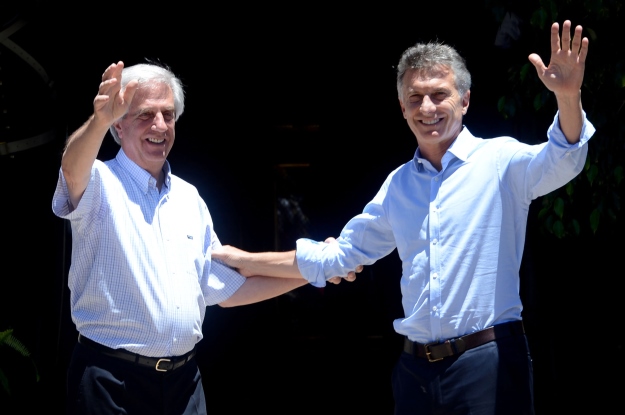Last week, U.S. President Donald Trump promised “strong and swift economic actions” if Venezuelan President Nicolás Maduro goes through with the July 30 vote to select delegates to the constituent assembly. This announcement comes after an increasingly desperate situation in Venezuela has been met with remarkable regional inaction, producing a power vacuum not seen for decades.
Those, however, who hope for swift U.S. action – for example, in the form of an oil embargo – are profoundly mistaken about its effects. Supporters of such a move argue that the havoc caused by broad sanctions would quickly lead to Maduro’s ouster, setting the stage for a return to democracy. Yet with the Venezuelan government desperately in need of foreign culprits for the country’s economic woes, a U.S. oil embargo would provide the ideal excuse for Maduro.
As is the case with Cuba, being the target of U.S. sanctions tends to cause the so-called “rally ’round the flag effect,” increasing the government’s approval ratings and lending more credibility to the claims that the real cause of Venezuela’s problems is foreign meddling – as columnist Moisés Naím pointed out. With the armed forces already in control of national food distribution, those in power would not only earn even more money – due to even greater scarcity – but also use the increased scarcity to literally starve opposition strongholds, adding to the tremendous suffering of Venezuela’s population. It would also poison U.S.-Latin American relations for years to come, negatively affecting many other areas of cooperation. Targeted sanctions against a few individuals close to the Maduro administration, like those announced today, will be more effective and less harmful to the population.
The number of voices in Washington calling for U.S. action, however, is growing. Despite a broad consensus across the region that Venezuela is no longer a democracy, governments across South America are unable to agree on imposing meaningful diplomatic pressure on the authoritarian regime in Caracas, though they have a variety of mechanisms at their disposal, such as Mercosur’s democracy clause. Yet even for those with low expectations, the declaration crafted by Mercosur’s leaders last week in Mendoza on the situation in Venezuela was surprisingly timid, in effect reassuring Nicolás Maduro that he would have little to fear from his neighbors.
The country perhaps most invested in helping Venezuela overcome its internal conflict is Argentina. Particularly since the departure of Foreign Minister Susana Malcorra, who had been reluctant to adopt a tougher stance on Venezuela, the Argentine government has led regional efforts to increase diplomatic pressure. Indeed, the initial draft presented by Malcorra’s successor, Jorge Faurie, contained a sharp rebuke of Maduro’s proposal to write a new constitution. Yet the final declaration does not even mention the existence of the democracy clause, and omits both the opposition’s informal referendum as well as the looming vote on July 30 for the constituent assembly – a move that, most agree, would erase the last vestiges of democracy in Venezuela.
There are two reasons for the remarkably tame result. Most importantly, Uruguay insisted on removing more explicit threats to Caracas. In Montevideo, the governing Broad Front coalition contains both moderates who readily agree that Maduro has gone too far, and radicals who insist on defending the Bolivarian revolution. Yet President Tabaré Vázquez alone would not have been able to withstand the joint pressure of the other three members of Mercosur.
Brazil is equally responsible. Indeed, as Matias Spektor points out in a recent column for Folha de São Paulo, the Brazilian government of Michel Temer may have been strong on rhetoric when it comes to Venezuela, but is ultimately unwilling to prioritize the matter or take any real action – such as mobilizing its ambassadors in the Caribbean to pressure governments there to stop protecting Venezuela at the OAS. With time for implementing reforms scarce and the political situation in Brasília too unstable, no one in Brasília relishes the thought of dedicating time and energy to a foreign policy challenge that will not be solved before Temer leaves the presidency.
From a regional point of view, allowing the situation in Caracas to fester is remarkably short-sighted, and poses a risk to one of Brazil’s most cherished foreign policy goals: reducing the extra-regional involvement in South American security issues. After all, if left unaddressed for long periods of time, profound crises like the one in Venezuela may increase the likelihood of increased U.S. engagement in South America. This does not mean that the United States is committed to greater involvement in the region per se. On the contrary, there is a growing consensus in Washington that intervening in South America is not only a strategy of secondary importance, but also a risky one. However, once a crisis is believed to threaten U.S. interests – whether in the form of a growing number of migrants or by affecting stability on a regional scale – the likelihood of a more assertive stance by the U.S. government increases, as President Trump’s recent comments indicate. The continued inaction of neighboring nations in the face of Venezuela’s collapse already severely weakens the belief in the effectiveness of existing regional mechanisms, carefully built over the past decades.
With meaningful hope for dialogue between the government and the opposition gone for now, it is particularly up to Brasília and Montevideo to allow for the advancement of regional efforts to push for a peaceful transition of power. Meanwhile, governments in the region should focus on what is most urgent: to pressure the Venezuelan government to accept foreign humanitarian aid – medicine and food supplies – to reach those who need it most.








